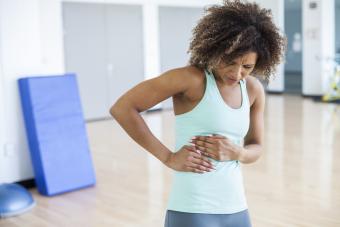
If you have experienced this discomfort, you may ask yourself, "Why do my legs itch when I exercise?" What you are feeling is not uncommon. It can have several causes, giving you different actions to take to treat and prevent your itching.
Symptoms
Symptoms vary in their severity. In addition to the obvious itching, you may also experience large patches of red areas on your legs. Your skin may blister or red bumps may appear. If you scratch your itchy skin, you may aggravate your condition.
Ruling Out the Obvious
The first thing you should do is to rule out the obvious causes for itchy skin. Detergents and body lotions or powders can irritate sensitive skin, especially when skin is coming in contact with skin during exercise. To eliminate an allergic reaction, you may want to consider switching to a non-scented detergent. You will also want to refrain from using lotion on your legs prior to exercising.
Another cause can simply be dry skin. Showering frequently during the winter can rob skin of essential oils, causing dry, flaky skin. Your diet may also cause similar symptoms. A diet low in essential fatty acids can also lead to poor skin condition. Dry skin is also a symptom of certain medical conditions, such as hypothyroidism.
Prickly Heat
If you experience the itchy feelings only when you exercise, you may be experiencing prickly heat or miliaria. This condition occurs when the pores at the surface of your skin become clogged due to sweat and debris. If sweat cannot leave the body, it will act as an irritant, causing an inflammatory response. This consequence leads to the redness and swelling associated with the itching.
Causes
You are more likely to experience prickly heat when conditions are warm and humid during the summer months, leading you to perspire more when exercising outdoors. The more you sweat, the more likely the skin ducts will become clogged.
Wearing non-breathable fabrics like polyester can also contribute to your discomfort. Clothing which is tight-fitting may also trap sweat at your skin surface, further irritating your skin.
Fitness Level
Your fitness level may also play a role when you consider, "Why do my legs itch when I exercise?" When you exercise regularly, adaptations occur within your circulatory system to make your workouts more efficient. Your blood vessels become more flexible and elastic to handle the high blood volume circulating through your system.
Your body will attempt to cool itself by directing blood flow to the surface of your skin, especially your extremities. Your blood vessels dilate to accommodate the blood rushing to your legs. If you are new to exercise, your body may have not yet adapted to the rigors of exercise. Rather than expand, the smaller capillaries of your circulatory system may collapse, triggering a nervous sensation which your body interprets as itching.
Why Do My Legs Itch When I Exercise?
Prevention is the best course of action when dealing with itchy skin. When exercising, wear loose-fitting clothing in breathable fabrics. This can help perspiration evaporate as well as avoid chaffing and other skin irritations. If prickly heat is the culprit, you may find it more comfortable to shower prior to exercising to remove any sweat and debris which are on your skin surface before working out. You should also avoid shaving before exercise.
You may also find it helpful to prevent dry skin irritation by regularly using a skin lotion. You can also take action from a nutritional perspective by including more foods containing essential fatty acids, such as cold-water fish like tuna or salmon. Alternatively, you can take a fish oil supplement to boost your intake.
If you are experiencing prickly heat, ointments containing corticosteroid may provide some relief. You may even consider taking an oral antihistamine to cope with the inflammatory response. If your skin has become infected from scratching, antibiotic ointments may be necessary.
Keeping your skin cool and dry by taking preventive measures can help you avoid the irritation of itchy skin when exercising. If you are prone to it, you may want to exercise in cooler morning hours. Staying comfortable while exercising will help prevent your workout from becoming an unpleasant experience.







